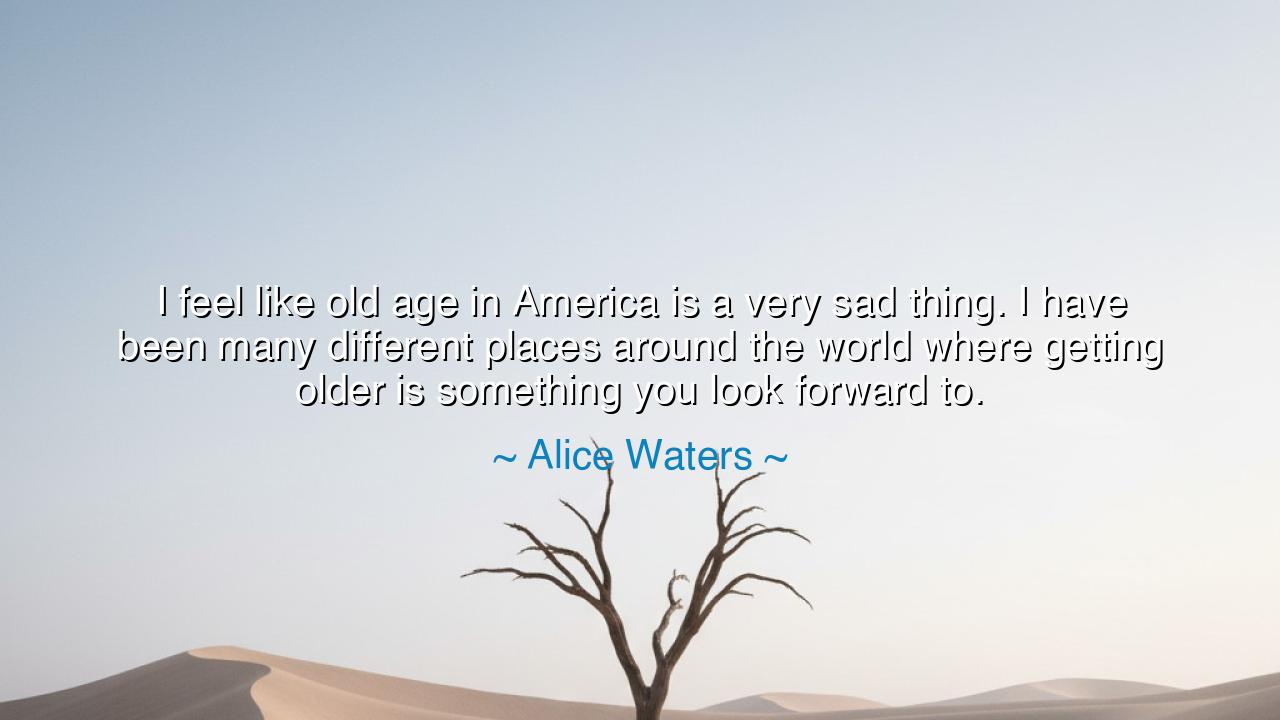
I feel like old age in America is a very sad thing. I have been
I feel like old age in America is a very sad thing. I have been many different places around the world where getting older is something you look forward to.






“I feel like old age in America is a very sad thing. I have been many different places around the world where getting older is something you look forward to.” — so spoke Alice Waters, and her words strike at the heart of a cultural wound. They remind us that while age is the destiny of all, the way a society treats its elders reveals its soul. In one land, old age is seen as burden; in another, it is crown and honor.
The sadness Waters names lies not in aging itself, but in the way America often isolates and diminishes its elders. Instead of reverence, there is dismissal. Instead of gratitude, there is impatience. The wisdom gathered through decades of living, loving, struggling, and learning is left to wither, when it could instead nourish the younger generations. This, she laments, is a tragedy not of nature, but of culture.
Yet around the world, she has seen a different way. In certain villages of India, the elderly are honored as living libraries, consulted in family matters and community disputes. In Japan, the festival of Respect for the Aged Day celebrates the lives of grandparents and elders, lifting them high as symbols of endurance and guidance. In these places, getting older is not feared but anticipated, for it means stepping into a role of dignity, teaching, and authority.
Consider the story of Cato the Elder, the Roman statesman. Though his youth was marked by war and politics, his later years brought him deeper respect. Even in old age, when his body weakened, his voice in the Senate carried weight. He was revered not because he was young and strong, but because time had tempered him into wisdom. Rome knew that its elders were guardians of memory, protectors of tradition, and beacons for the next generation.
The origin of Waters’ reflection lies in her observation of human culture, born of travel and of curiosity. It is a reminder that how we view age is not a law of nature, but a choice. One society may scorn what another treasures. In this, she teaches us that we too must choose: will we see old age as decline, or as ascension? Will we honor the wrinkles of experience, or ignore them as inconvenience?
The lesson is clear: we must change the way we see our elders, for in honoring them we honor ourselves. Youth is fleeting, but age awaits us all. If we do not build a culture that treasures the old, then we build a culture that will one day abandon us. Reverence for the aged is not charity; it is wisdom, for their survival, their stories, and their endurance are the very foundation upon which our lives stand.
Practical action follows: seek out the elders in your life—your parents, your grandparents, the older neighbor who sits quietly by the window. Listen to their stories. Ask for their advice. Invite them to the table not as burdens, but as honored guests. Celebrate their birthdays not with pity, but with reverence. And if you are young, remember this: you are not immortal. The way you treat the aged today is the way you will be treated tomorrow.
Thus Alice Waters’ words endure as both lament and challenge. Old age need not be sad; it can be radiant, noble, awaited with joy. But this transformation requires us to reshape our vision of life’s final chapters. Let us learn from cultures that celebrate their elders, and let us make our own societies ones in which the autumn of life is not feared, but cherished as the most luminous of seasons.






AAdministratorAdministrator
Welcome, honored guests. Please leave a comment, we will respond soon